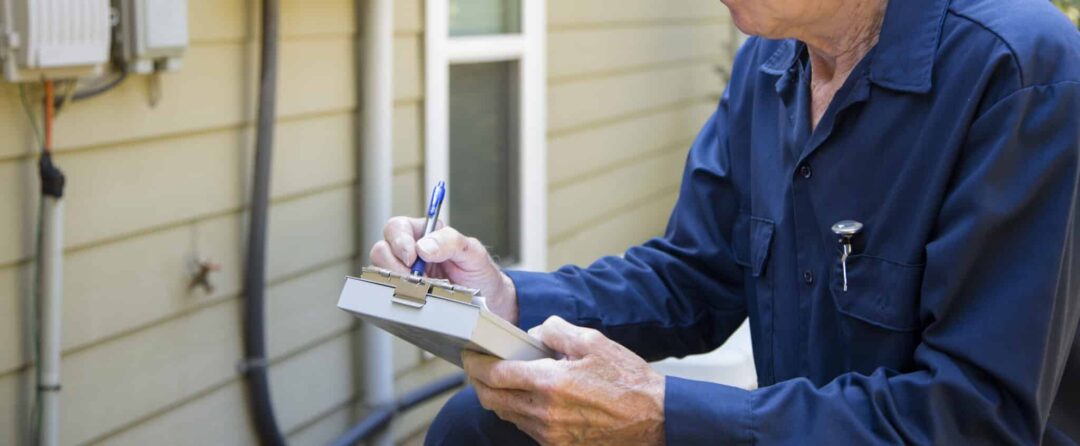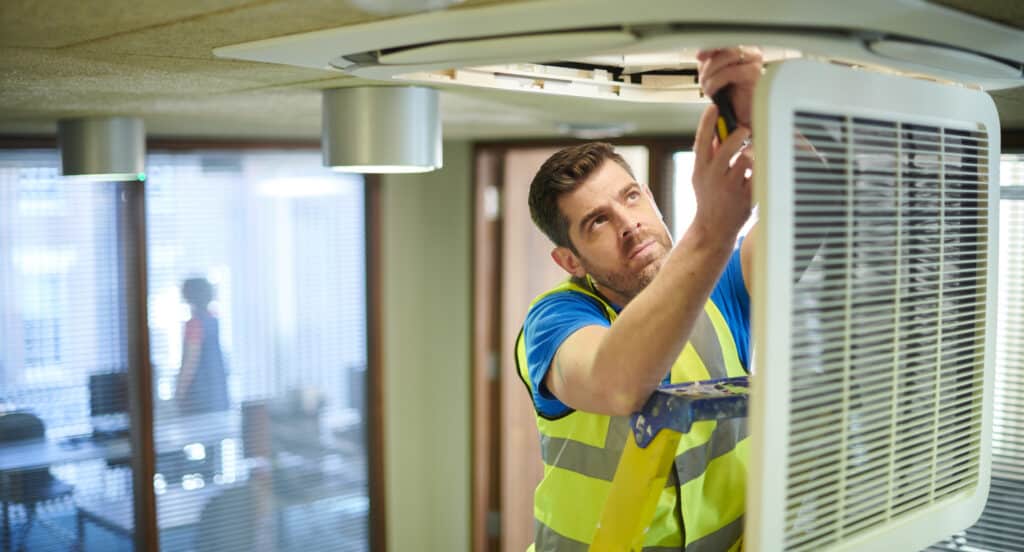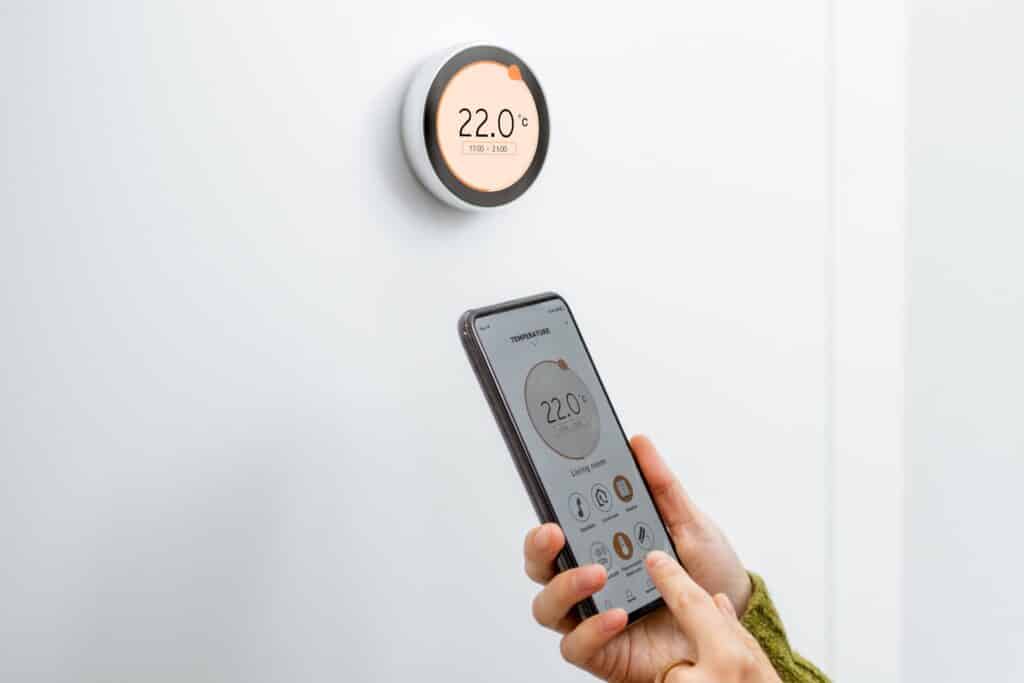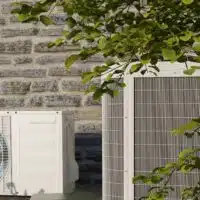The Role of HVAC in Home Energy Audits

Are you tired of high energy bills and inconsistent home temperatures?
A home energy audit could be the solution you’re looking for.
Home energy audits are comprehensive evaluations of your home’s energy use, pinpointing areas where you can improve efficiency. This process involves a thorough examination of various systems and structures within your home, with a particular focus on heating, ventilation, and air conditioning (HVAC) systems.
By identifying inefficiencies and recommending improvements, home energy audits can help you save money and enhance your home’s comfort.
In this article, we’ll delve into the role of HVAC systems in home energy audits and why they are crucial for energy efficiency. You’ll learn about the common issues that affect HVAC performance and discover how a detailed audit can lead to substantial savings and a more comfortable living environment.
Home Energy Audit: Importance of Energy Efficiency
Why should you care about energy efficiency? It goes beyond just reducing your energy bills. Energy efficiency is crucial for minimizing environmental impact, enhancing home comfort, and improving overall living conditions.
Lower Energy Bills
One of the most immediate benefits of improving energy efficiency is the reduction in utility costs. An energy-efficient home uses less power, leading to significant savings over time. This is particularly important for homeowners in areas with extreme temperatures, like Sedona, AZ, where HVAC systems are used extensively.
Environmental Impact
By reducing energy consumption, you also reduce your carbon footprint. Energy-efficient homes contribute to lower greenhouse gas emissions, helping combat climate change. This is a significant consideration for environmentally conscious homeowners looking to make a positive impact.
Enhanced Comfort
Energy efficiency isn’t just about saving money and the planet; it also enhances your comfort. Efficient HVAC systems maintain consistent temperatures throughout your home, eliminating hot or cold spots. Improved insulation and sealing prevent drafts, creating a more stable and comfortable indoor environment.
Increased Home Value
Energy-efficient upgrades can increase the value of your home. Prospective buyers are often willing to pay a premium for homes with lower utility costs and improved comfort. Energy efficiency is an attractive feature in the real estate market, making your property more competitive.
Better Air Quality
Upgrading your HVAC system and improving your home’s energy efficiency can also enhance indoor air quality. Efficient systems filter out pollutants and maintain proper ventilation, reducing the risk of respiratory issues and allergies. This is especially beneficial for homes in areas prone to dust and allergens.
Financial Incentives
Various federal, state, and local programs offer incentives for energy-efficient upgrades. These can include tax credits, rebates, and low-interest loans, making it financially easier to invest in energy efficiency. Taking advantage of these programs can further offset the costs of improvements.
By prioritizing energy efficiency, you not only save money but also contribute to a healthier environment and a more comfortable living space.
Overview of the Home Energy Audit Process
A home energy audit is a systematic process designed to assess how much energy your home consumes and to evaluate what measures you can take to make it more energy efficient. Understanding this process is key to appreciating the value it brings to your home and your wallet.
Initial Consultation
The home energy audit process typically begins with an initial consultation. During this stage, the auditor discusses your energy concerns, reviews your recent energy bills, and gathers information about your home’s energy use patterns. This helps tailor the audit to your specific needs.
Exterior Inspection
The exterior inspection involves a thorough examination of your home’s outer shell. The auditor checks for areas where air might leak, such as windows, doors, and the foundation. They also look at insulation levels and the condition of the roof and walls.
Interior Examination
Inside your home, the auditor inspects various elements that impact energy efficiency. This includes windows, doors, lighting, and appliances. They assess insulation and check for drafts or air leaks using tools like blower doors and infrared cameras.
HVAC System Check
A significant part of the home energy audit focuses on your HVAC system. The auditor examines your heating and cooling equipment, ductwork, and ventilation. They check for issues such as leaks, improper insulation, and inefficient equipment that can lead to energy loss.
Diagnostic Testing
Diagnostic tests are a crucial component of the audit. Blower door tests measure the airtightness of your home, while infrared cameras help identify areas where insulation is lacking or air leaks are present. These tests provide valuable data to pinpoint energy loss areas.
Review of Findings
After the inspection and tests, the auditor reviews their findings with you. They provide a detailed report outlining the current energy efficiency of your home and highlight problem areas. The report includes recommendations for improvements and potential cost savings.
Recommendations and Solutions
Based on the home energy audit findings, the auditor suggests practical solutions to improve your home’s energy efficiency. This can range from simple fixes like sealing air leaks to more extensive upgrades such as replacing outdated HVAC systems or adding insulation.
Implementation Plan
The final step involves creating an implementation plan. The auditor helps prioritize the recommended improvements, taking into account your budget and goals. They may also guide you on accessing financial incentives and rebates to help offset the costs.
A home energy audit is a comprehensive process that not only identifies areas where your home is losing energy but also provides actionable solutions to enhance efficiency.
Understanding HVAC Systems in Home Energy Audits
Heating, ventilation, and air conditioning (HVAC) systems play a crucial role in home energy audits. These systems account for a significant portion of a home’s energy use, making them a primary focus during the audit process.
Role of HVAC in Energy Consumption
HVAC systems are responsible for maintaining a comfortable indoor climate. However, they can be major energy consumers, especially if they’re outdated or inefficient. During a home energy audit, the efficiency and performance of your HVAC system are closely examined. This involves checking how much energy your heating and cooling equipment uses and identifying opportunities to reduce consumption without compromising comfort.
Common HVAC Issues Affecting Energy Efficiency
Several common issues can cause your HVAC system to use more energy than necessary. Identifying and addressing these issues is a key component of a home energy audit:
- Leaks in Ductwork: Air leaks in the ductwork can lead to significant energy loss as conditioned air escapes before reaching its intended destination.
- Insufficient Insulation: Poor insulation around ducts and in the home can force your HVAC system to work harder to maintain desired temperatures.
- Outdated Equipment: Older HVAC systems are generally less efficient than modern ones. They may consume more energy to provide the same level of heating or cooling.
- Incorrect Sizing: HVAC systems that are too large or too small for your home can lead to inefficiency and increased energy costs.
- Poor Maintenance: Lack of regular maintenance can lead to clogged filters, dirty coils, and other issues that reduce system efficiency.
Components of a Home Energy Audit
When conducting a home energy audit, several key components are examined to assess the overall efficiency of your HVAC system:
- Room-by-Room Examination: The auditor inspects each room to check for temperature inconsistencies, airflow issues, and signs of energy loss.
- Equipment Used: Tools such as blower doors and infrared cameras are used to detect air leaks and insufficient insulation. These tools provide a detailed view of where your home is losing energy.
- Initial Assessment and Preparation: Before the audit, homeowners are typically advised to gather energy bills and past usage data. This information helps the auditor understand your home’s energy consumption patterns and identify areas for improvement.
Understanding the role of your HVAC system in energy consumption is essential for making informed decisions about energy efficiency improvements.

The HVAC System Examination
A thorough examination of your HVAC system is a critical part of a home energy audit. This process involves inspecting heating and cooling equipment, evaluating ductwork and insulation, and identifying sources of energy loss.
Inspecting Heating and Cooling Equipment
The first step in the HVAC examination is a detailed inspection of your heating and cooling equipment. This includes:
- Age and Condition: Older units are less efficient and more prone to breakdowns. The auditor will check the age and condition of your furnace, air conditioner, or heat pump to assess if they are due for replacement.
- Efficiency Ratings: Modern HVAC systems have efficiency ratings such as SEER (Seasonal Energy Efficiency Ratio) for air conditioners and AFUE (Annual Fuel Utilization Efficiency) for furnaces. Higher ratings indicate better efficiency. The auditor will review these ratings to evaluate your equipment’s performance.
- Maintenance History: Regular maintenance is key to the efficient operation of HVAC systems. The auditor will ask about the maintenance history of your equipment, checking for signs of neglect such as dirty filters or unserviced parts.
Evaluating Ductwork and Insulation
Ductwork and insulation play a significant role in your HVAC system’s efficiency:
- Ductwork Inspection: The auditor will inspect the ductwork for leaks, blockages, and poor connections. Leaky ducts can lose up to 30% of conditioned air, leading to higher energy bills and reduced comfort.
- Insulation Levels: Proper insulation is crucial for maintaining desired temperatures. The auditor will check insulation levels in your attic, walls, and around ducts. Inadequate insulation can force your HVAC system to work harder, consuming more energy.
Identifying Energy Loss in HVAC Systems
Detecting and addressing energy loss is vital for improving HVAC efficiency:
- Common Sources of Energy Loss: Common sources include air leaks, poor insulation, and inefficient equipment. The auditor will look for these issues using diagnostic tools such as blower doors and infrared cameras.
- Techniques for Detecting Inefficiencies: Blower door tests measure the airtightness of your home by depressurizing it and detecting air leaks. Infrared cameras visualize temperature differences, revealing areas where insulation is lacking or air is escaping.
By examining these components, the auditor can identify specific issues that contribute to energy loss. Addressing these issues can significantly improve your HVAC system’s efficiency, resulting in lower energy bills and enhanced home comfort.
Identifying Energy Loss in HVAC Systems
Understanding and addressing energy loss in HVAC systems is essential for improving home efficiency and reducing energy bills. This section outlines common sources of energy loss and the techniques used to detect inefficiencies.
Common Sources of Energy Loss
Several factors can cause your HVAC system to lose energy, leading to higher costs and reduced comfort:
- Air Leaks: Gaps and cracks around windows, doors, and ductwork can let conditioned air escape and allow unconditioned air to enter. This forces your HVAC system to work harder to maintain the desired temperature.
- Poor Insulation: Inadequate insulation in walls, attics, and around ducts can result in significant energy loss. Heat can escape in the winter and enter in the summer, making your HVAC system less efficient.
- Outdated Equipment: Older HVAC systems are often less efficient and more prone to breakdowns. They can consume more energy than newer, high-efficiency models to provide the same level of heating or cooling.
- Improper Sizing: HVAC systems that are too large or too small for your home can lead to inefficiency. An oversized system may cycle on and off frequently, while an undersized system may run continuously, both of which waste energy.
- Blocked Vents and Ducts: Blocked or dirty vents and ducts can restrict airflow, reducing the efficiency of your HVAC system. This can cause uneven heating or cooling and increase energy consumption.
Techniques for Detecting Inefficiencies
Energy auditors use various techniques and tools to detect inefficiencies in your HVAC system:
- Blower Door Tests: These tests help measure the airtightness of your home. A powerful fan is mounted in an exterior door, pulling air out of the house and lowering the indoor air pressure. This allows the auditor to detect air leaks and identify areas where air is entering or escaping.
- Infrared Cameras: Infrared (thermal) cameras detect temperature differences in your home’s surfaces. They can reveal poorly insulated areas, air leaks, and other sources of energy loss by showing hot and cold spots.
- Duct Leakage Tests: These tests measure the amount of air leakage in your ductwork. A calibrated fan and pressure gauge are used to pressurize the duct system and identify leaks, which can then be sealed to improve efficiency.
- Combustion Analyzer: For homes with gas or oil heating, a combustion analyzer can check the efficiency of your furnace or boiler. It measures the gases produced during combustion to ensure the equipment is operating efficiently and safely.
Addressing Energy Loss
Once inefficiencies are identified, the next step is to address them:
- Sealing Air Leaks: Use weatherstripping and caulking to seal gaps around windows, doors, and other openings. This prevents conditioned air from escaping and unconditioned air from entering.
- Improving Insulation: Adding or upgrading insulation in your attic, walls, and around ducts can significantly reduce energy loss. Proper insulation helps maintain a consistent indoor temperature, reducing the workload on your HVAC system.
- Upgrading Equipment: Consider replacing outdated HVAC systems with newer, high-efficiency models. Modern systems are designed to use less energy while providing better performance.
- Maintaining HVAC Systems: Regular maintenance, such as cleaning or replacing filters, checking ductwork, and servicing equipment, ensures your HVAC system operates efficiently and effectively.
By identifying and addressing these common sources of energy loss, you can improve your HVAC system’s efficiency, reduce energy costs, and enhance overall home comfort.

Improving HVAC Efficiency
Improving the efficiency of your HVAC system can lead to significant energy savings and a more comfortable home. This section outlines recommended upgrades and energy-saving practices that can enhance your HVAC system’s performance.
Recommended Upgrades
Investing in modern technology and making strategic upgrades can greatly enhance your HVAC system’s efficiency:
- Programmable Thermostats: Installing a programmable thermostat allows you to set temperatures based on your schedule. This ensures your HVAC system operates only when needed, reducing energy waste.
- Smart Thermostats: Smart thermostats take programmability a step further by learning your habits and adjusting temperatures automatically. They can also be controlled remotely via smartphone, giving you greater control over your home’s climate.
- Sealing Ducts: Properly sealing your ductwork can prevent air leaks, ensuring that conditioned air reaches its intended destination. This improves the efficiency of your heating and cooling systems and enhances overall comfort.
- Upgrading to High-Efficiency Equipment: Replacing old, inefficient HVAC units with Energy Star-rated models can significantly reduce energy consumption. Look for units with high SEER (Seasonal Energy Efficiency Ratio) and AFUE (Annual Fuel Utilization Efficiency) ratings.
- Insulating Ducts and Pipes: Adding insulation around ducts and pipes reduces heat loss or gain, ensuring your HVAC system works more efficiently.
Energy-Saving HVAC Practices
In addition to upgrades, adopting energy-saving practices can help maintain your HVAC system’s efficiency:
- Regular Maintenance: Schedule regular maintenance checks to keep your HVAC system running smoothly. This includes cleaning or replacing filters, checking refrigerant levels, and inspecting ductwork.
- Optimal Thermostat Settings: Set your thermostat to energy-efficient temperatures. During winter, keep it around 68°F when you’re home and lower when you’re away. In summer, set it to 78°F when home and higher when away.
- Using Ceiling Fans: Ceiling fans can help distribute air more evenly, allowing you to set your thermostat a few degrees higher in summer and lower in winter without sacrificing comfort.
- Blocking Sunlight: Use blinds, shades, or curtains to block direct sunlight during hot days. This reduces the load on your cooling system and helps maintain a consistent indoor temperature.
- Ensuring Proper Ventilation: Good ventilation prevents excess humidity, which can make your home feel warmer in summer and cooler in winter. Use exhaust fans in kitchens and bathrooms to remove moisture and improve air circulation.
FAQs
-
What is a Home Energy Audit?
A home energy audit is an assessment that evaluates your home’s energy use and identifies areas for improvement. It involves inspecting your home’s systems, including HVAC, insulation, and ductwork, to find inefficiencies and recommend solutions for enhancing energy efficiency.
-
How Often Should I Get an Energy Audit?
It’s recommended to get a home energy audit every 3 to 5 years, especially if you’ve made significant changes to your home or notice rising energy bills. Regular audits can help maintain optimal energy efficiency and address new issues that may arise over time.
-
What Are the Best HVAC Upgrades for Energy Efficiency?
The best HVAC upgrades for energy efficiency include installing programmable or smart thermostats, sealing and insulating ductwork, and replacing outdated units with high-efficiency models. Regular maintenance, such as cleaning filters and ensuring proper ventilation, also plays a crucial role in maintaining efficiency.
-
Can I Perform an Energy Audit Myself?
While you can perform a basic energy audit yourself by checking for drafts, insulation, and reviewing energy bills, a professional audit is more thorough. Professionals use specialized tools like blower doors and infrared cameras to detect inefficiencies that might be missed in a DIY audit.
-
How Do I Find a Qualified Energy Auditor in Sedona, AZ?
To find a qualified energy auditor in Sedona, AZ, look for certified professionals through organizations like the Residential Energy Services Network (RESNET) or the Building Performance Institute (BPI). Local HVAC companies and utility providers may also offer audit services or recommendations.








